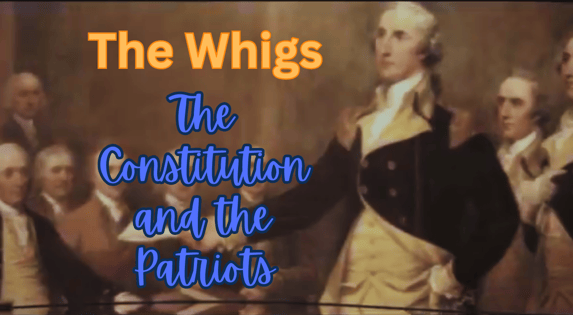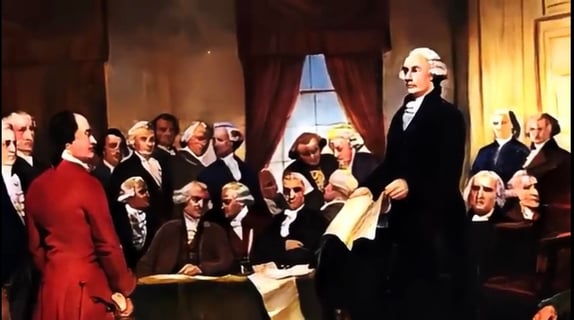The Constitution and the Patriots: The Role of the Whigs in Shaping America's Founding Ideals
The American Revolution is a defining chapter in the nation's history, marked by courageous individuals who fought for freedom and independence. While the Founding Fathers played a pivotal role in shaping the nation's ideals and drafting the Constitution, they were not alone in their commitment to liberty and self-governance. Among them were a group known as the "Whigs," who made significant contributions to the founding of the United States and the creation of the Constitution.
Casey Adams
10/4/20234 min read


The Whigs and the Road to Revolution
The Whigs were a diverse and influential group of American colonists who played a pivotal role in resisting British rule and shaping the ideological foundation of the American Revolution.
Though their ranks included merchants, farmers, intellectuals, and politicians, they shared a common goal: opposing British tyranny and advocating for greater autonomy and self-governance.
Origins and Ideological Foundations
The American Whigs derived their name and ideological inspiration from their British counterparts, who had long championed constitutional government and limits on monarchical power.
Influenced by Enlightenment thinkers such as John Locke, the American Whigs believed in natural rights, the social contract, and the right of the people to challenge an oppressive government.
Their philosophy was deeply rooted in the belief that governance should be based on the consent of the governed, a principle that would later be enshrined in the Declaration of Independence.
Resistance to British Policies
The Whigs were at the forefront of the colonial resistance to British taxation and regulation.
Acts such as the Stamp Act (1765) and the Townshend Acts (1767) galvanized widespread opposition, as colonists argued that taxation without representation was a violation of their rights as Englishmen.
Samuel Adams, one of the most ardent Whig leaders, helped organize the Sons of Liberty, a secret society dedicated to opposing British authority through protests, pamphlets, and direct action.
Their activities, including the Boston Tea Party (1773), inflamed tensions between Britain and the colonies, setting the stage for armed conflict.
Whigs in the Continental Congress
As resistance escalated, many Whigs became prominent members of the Continental Congress, where they worked to unify the colonies and chart a path toward independence.
John Adams, a leading Whig, was instrumental in persuading his colleagues to break from Britain, while his wife, Abigail Adams, provided intellectual and moral support, famously advocating for women’s rights in her correspondence.
Other notable Whigs in Congress, such as Richard Henry Lee and Thomas Jefferson, were key figures in drafting resolutions and laying the groundwork for independence.
The Declaration of Independence and Whig Influence
The principles enshrined in the Declaration of Independence were heavily influenced by Whig ideology.
Thomas Jefferson, the document’s principal author, drew upon the writings of Locke and other Enlightenment philosophers to articulate a vision of government based on natural rights and the right of the people to overthrow tyranny.
The Declaration’s assertion that “all men are created equal” and endowed with “unalienable Rights” reflected the core beliefs of the Whigs and provided a moral justification for the Revolution.
Whigs in the Revolutionary War
Whigs were not only political theorists and activists; many also took up arms in the fight for independence.
Military leaders such as Nathanael Greene, John Paul Jones, and Benedict Arnold (before his infamous defection) played crucial roles in securing key victories against British forces.
The Whigs' commitment to liberty was evident both on the battlefield and in their efforts to establish state governments that embodied republican principles.
State Constitutions and the Foundations of American Governance
During and after the war, Whig leaders took the lead in drafting state constitutions that reflected their vision of a government rooted in popular sovereignty, separation of powers, and individual rights.
These state constitutions served as important precursors to the U.S. Constitution and helped shape the emerging American political identity.
For example, Pennsylvania’s 1776 Constitution was one of the most radical, instituting broad voting rights and a unicameral legislature.
The Constitutional Convention and Whig Thought
Though the term "Whig" was not widely used by the time of the Constitutional Convention of 1787, many delegates held beliefs shaped by Whig principles.
James Madison, known as the "Father of the Constitution," was deeply influenced by Whig thought, particularly regarding the dangers of unchecked power.
His advocacy for a system of checks and balances reflected the Whigs’ long-standing concerns about government overreach.
Similarly, George Mason, a key architect of the Bill of Rights, argued that the new Constitution must explicitly protect individual liberties—a central tenet of Whig ideology.
The Bill of Rights and Whig Legacy
The push for a Bill of Rights was largely driven by those with Whig sympathies.
Figures such as Patrick Henry and George Mason feared that the new federal government could become too powerful and demanded explicit guarantees of fundamental freedoms.
Their efforts resulted in the first ten amendments to the Constitution, which enshrined rights such as freedom of speech, religion, and the press—rights that had been vigorously defended by the Whigs throughout the revolutionary struggle.
The Ratification Debates and the Whigs’ Influence
The ratification of the Constitution sparked intense debate between Federalists, who supported the document, and Antifederalists, who feared it granted excessive power to the central government.
While Antifederalists and Whigs were not synonymous, they shared common concerns about protecting individual liberties and limiting centralized authority.
Prominent opponents of the Constitution, such as George Clinton and Melancton Smith, echoed Whig arguments in their insistence on a Bill of Rights as a condition for ratification.
Conclusion
The Whigs played a vital role in shaping the American Revolution and the founding principles of the United States.
Their steadfast commitment to liberty, resistance to tyranny, and advocacy for constitutional government influenced every stage of the nation’s birth—from the early protests against British policies to the drafting of the Constitution and the Bill of Rights.
Though the term "Whig" eventually faded from American political discourse, their ideas endured, forming the bedrock of the democratic institutions and liberties that continue to define the United States today.
"The Whigs"



